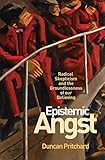Epistemic Angst : Radical Skepticism and the Groundlessness of Our Believing / Duncan Pritchard.
Material type: TextSeries: Soochow University Lectures in Philosophy ; 5Publisher: Princeton, NJ : Princeton University Press, [2015]Copyright date: ©2016Edition: Pilot project. eBook available to selected US libraries onlyDescription: 1 online resourceContent type:
TextSeries: Soochow University Lectures in Philosophy ; 5Publisher: Princeton, NJ : Princeton University Press, [2015]Copyright date: ©2016Edition: Pilot project. eBook available to selected US libraries onlyDescription: 1 online resourceContent type: - 9780691167237
- 9781400873913
- 121 23
- B837 .P75 2017
- online - DeGruyter
- Issued also in print.
| Item type | Current library | Call number | URL | Status | Notes | Barcode | |
|---|---|---|---|---|---|---|---|
 eBook
eBook
|
Biblioteca "Angelicum" Pont. Univ. S.Tommaso d'Aquino Nuvola online | online - DeGruyter (Browse shelf(Opens below)) | Online access | Not for loan (Accesso limitato) | Accesso per gli utenti autorizzati / Access for authorized users | (dgr)9781400873913 |
Browsing Biblioteca "Angelicum" Pont. Univ. S.Tommaso d'Aquino shelves, Shelving location: Nuvola online Close shelf browser (Hides shelf browser)

|

|

|

|

|

|

|
||
| online - DeGruyter Magazines and the Making of America : Modernization, Community, and Print Culture, 1741-1860 / | online - DeGruyter Beyond the Beat : Musicians Building Community in Nashville / | online - DeGruyter Nietzsche's Jewish Problem : Between Anti-Semitism and Anti-Judaism / | online - DeGruyter Epistemic Angst : Radical Skepticism and the Groundlessness of Our Believing / | online - DeGruyter On War and Democracy / | online - DeGruyter Classical Confucian Political Thought : A New Interpretation / | online - DeGruyter The Princeton History of Modern Ireland / |
Frontmatter -- Contents -- Acknowledgments -- Introduction -- Part 1. Epistemic Angst -- Chapter 1. Radical Skepticism and Closure -- Chapter 2. Radical Skepticism and Underdetermination -- Part 2. Wittgenstein and the Groundlessness of Our Believing -- Chapter 3. Wittgenstein on the Structure of Rational Evaluation -- Chapter 4. Hinge Commitments -- Part 3. Epistemological Disjunctivism -- Chapter 5. Epistemological Disjunctivism and the Factivity of Reasons -- Chapter 6. Epistemological Disjunctivism and Closure-Based Radical Skepticism -- Part 4. Farewell to Epistemic Angst -- Chapter 7. Farewell to Epistemic Angst -- Notes -- Bibliography -- Index
Epistemic Angst offers a completely new solution to the ancient philosophical problem of radical skepticism-the challenge of explaining how it is possible to have knowledge of a world external to us.Duncan Pritchard argues that the key to resolving this puzzle is to realize that it is composed of two logically distinct problems, each requiring its own solution. He then puts forward solutions to both problems. To that end, he offers a new reading of Wittgenstein's account of the structure of rational evaluation and demonstrates how this provides an elegant solution to one aspect of the skeptical problem. Pritchard also revisits the epistemological disjunctivist proposal that he developed in previous work and shows how it can effectively handle the other aspect of the problem. Finally, he argues that these two antiskeptical positions, while superficially in tension with each other, are not only compatible but also mutually supporting.The result is a comprehensive and distinctive resolution to the problem of radical skepticism, one that challenges many assumptions in contemporary epistemology.
Issued also in print.
Mode of access: Internet via World Wide Web.
In English.
Description based on online resource; title from PDF title page (publisher's Web site, viewed 23. Mai 2019)


